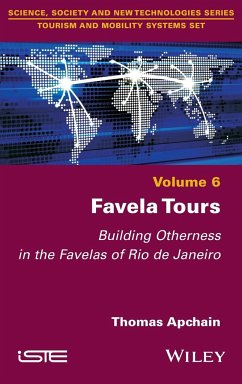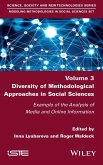- Gebundenes Buch
- Merkliste
- Auf die Merkliste
- Bewerten Bewerten
- Teilen
- Produkt teilen
- Produkterinnerung
- Produkterinnerung
For a long time, favelas were a source of fear for tourists visiting Rio de Janeiro. Now that they are more appealing, some have become popular tourist destinations even though they are still regarded as an "off the beaten track" activity. Favela Tours analyzes the factors behind the emergence of tourism in the favelas, places of otherness and authenticity for visitors who come mainly from Western Europe and North America. Based on ethnography of those involved in these practices (guides, residents and tourists), this book describes how the local and global forces are converging to make…mehr
Andere Kunden interessierten sich auch für
![Diversity of Methodological Approaches in Social Sciences Diversity of Methodological Approaches in Social Sciences]() Diversity of Methodological Approaches in Social Sciences158,99 €
Diversity of Methodological Approaches in Social Sciences158,99 €![The Great Reset and the Struggle for Liberty The Great Reset and the Struggle for Liberty]() Michael RectenwaldThe Great Reset and the Struggle for Liberty22,99 €
Michael RectenwaldThe Great Reset and the Struggle for Liberty22,99 €![Genesis Genesis]() Henry A KissingerGenesis24,99 €
Henry A KissingerGenesis24,99 €![On Privacy On Privacy]() Lawrence CappelloOn Privacy16,99 €
Lawrence CappelloOn Privacy16,99 €![The Extinction of Experience The Extinction of Experience]() Christine RosenThe Extinction of Experience11,99 €
Christine RosenThe Extinction of Experience11,99 €![The Great Reset and the Struggle for Liberty The Great Reset and the Struggle for Liberty]() Michael RectenwaldThe Great Reset and the Struggle for Liberty32,99 €
Michael RectenwaldThe Great Reset and the Struggle for Liberty32,99 €![Social Mentality and Online Life of China's Elderly Social Mentality and Online Life of China's Elderly]() Gao WenjunSocial Mentality and Online Life of China's Elderly185,99 €
Gao WenjunSocial Mentality and Online Life of China's Elderly185,99 €-
-
-
For a long time, favelas were a source of fear for tourists visiting Rio de Janeiro. Now that they are more appealing, some have become popular tourist destinations even though they are still regarded as an "off the beaten track" activity. Favela Tours analyzes the factors behind the emergence of tourism in the favelas, places of otherness and authenticity for visitors who come mainly from Western Europe and North America. Based on ethnography of those involved in these practices (guides, residents and tourists), this book describes how the local and global forces are converging to make favelas part of the western tourism system: a mechanism for fabricating and assimilating otherness.
Hinweis: Dieser Artikel kann nur an eine deutsche Lieferadresse ausgeliefert werden.
Hinweis: Dieser Artikel kann nur an eine deutsche Lieferadresse ausgeliefert werden.
Produktdetails
- Produktdetails
- Verlag: Wiley
- Seitenzahl: 240
- Erscheinungstermin: 27. Dezember 2023
- Englisch
- Abmessung: 240mm x 161mm x 17mm
- Gewicht: 522g
- ISBN-13: 9781786307675
- ISBN-10: 1786307677
- Artikelnr.: 69528011
- Herstellerkennzeichnung
- Libri GmbH
- Europaallee 1
- 36244 Bad Hersfeld
- gpsr@libri.de
- Verlag: Wiley
- Seitenzahl: 240
- Erscheinungstermin: 27. Dezember 2023
- Englisch
- Abmessung: 240mm x 161mm x 17mm
- Gewicht: 522g
- ISBN-13: 9781786307675
- ISBN-10: 1786307677
- Artikelnr.: 69528011
- Herstellerkennzeichnung
- Libri GmbH
- Europaallee 1
- 36244 Bad Hersfeld
- gpsr@libri.de
Thomas Apchain is a tourism specialist and a lecturer and researcher at ESTHUA (University of Angers, France).
Introduction ix
Chapter 1 The Invention of the Tourist Favela 1
1.1 The favela in the imaginary 2
1.2 The favelas of tourism 7
1.2.1 The favela, a relative urban category 7
1.2.2 Tourist favelas: Rocinha, Santa Marta and Vidigal 9
1.3 The rise of the favela tour, contextual elements 14
1.3.1 Mega-events and favela tours 15
1.3.2 Pacification 18
1.3.3 Tourism and pacification 20
1.4 History of the favela tours 22
1.4.1 1992-2008: the pioneers of favela tour success 22
1.4.2 2008-2016: the rise of the favela tours 25
Chapter 2 Visiting the Favela 27
2.1 A typical excursion with Favela Tour 27
2.1.1 On the way to the favela 28
2.1.2 Visiting Rocinha 33
2.1.3 Stop in Vila Canoas 37
2.2 Constants and variations of the favela tour model 40
2.2.1 The common foundation of favela tours 40
2.2.2 Main variations of the favela tour model 42
Chapter 3 Advantages of Tourist Mediation: The Guides of Rocinha 47
3.1 The guides, a variety of profiles and issues 49
3.1.1 Marcelo and Roberto, the external companies and the distanced gaze 49
3.1.2 Zezinho and Tony, the favela from the inside 55
3.1.3 Obi, Erik and Paolo, the indigenous guides 59
3.1.4 Alex and the independent guides 61
3.2 The privilege of mediation 62
3.2.1 New political intermediaries? 63
3.2.2 Away from mediation 65
Chapter 4 Distinguished Practices, Practices of Distinction 73
4.1 Criticism and distinction 73
4.1.1 A valorized practice 74
4.1.2 A criticized practice 81
4.1.3 Anti-tourist tourists, between legitimization and criticism 84
4.1.4 The denial of the tourist setting 85
4.2 Distinction, the driving force behind tourism in the favelas? 87
4.2.1 Ritualization and de-ritualization of tourism practices 88
4.2.2 Distinction in tourism 92
4.2.3 The legitimate culture of travel 98
4.2.4 The functioning of the distinction 100
Chapter 5 The Authenticity of the Favela 105
5.1 The favela and the "real Brazil" 107
5.2 Praise of the non-touristic 109
5.2.1 A perpetually renewed tourist opening 109
5.2.2 The denial of merchants in the favelas 113
5.3 The authenticity of poverty 115
5.3.1 The spontaneity of the favelas 115
5.3.2 A culture of poverty 120
5.4 Tourism, slum and poverty 128
Chapter 6 From Exoticism to Authenticity 133
6.1 Exoticism 133
6.1.1 Exoticism, deictics and dialectics 134
6.1.2 Movement in space, travel in time 135
6.1.3 Exoticism of the end and the end of exoticism 137
6.2 Authenticity, a scientific exoticism? 139
6.2.1 Anthropology and authenticity 140
6.2.2 Uniformity of the world and authenticity 142
Chapter 7 The Favela in the Market of Otherness 145
7.1 Authenticism and the crisis of otherness 145
7.2 Miniature worlds 147
7.3 Otherness and tourism, between celebration and domestication 151
Chapter 8 Gazes 157
8.1 Describing the gazes 158
8.2 The interactional norms of the gaze 161
8.2.1 Photographs and norms 162
8.2.2 From the photograph to the gaze 164
8.2.3 The gazed and the gazers 167
8.3 The space of the gaze 171
8.3.1 The modalities of the gaze 171
8.3.2 The danger of the gaze 173
8.3.3 Space of the gaze and authenticity 176
Chapter 9 Reality and the Tourism Frame 181
9.1 Narrative frame and experience 182
9.2 The tourism experience frame 185
9.2.1 The guide, a professional when it comes to framing 186
9.2.2 Framing and reframing 188
9.3 Avoidance and exclusion 191
Conclusion 195
References 199
Index 209
Chapter 1 The Invention of the Tourist Favela 1
1.1 The favela in the imaginary 2
1.2 The favelas of tourism 7
1.2.1 The favela, a relative urban category 7
1.2.2 Tourist favelas: Rocinha, Santa Marta and Vidigal 9
1.3 The rise of the favela tour, contextual elements 14
1.3.1 Mega-events and favela tours 15
1.3.2 Pacification 18
1.3.3 Tourism and pacification 20
1.4 History of the favela tours 22
1.4.1 1992-2008: the pioneers of favela tour success 22
1.4.2 2008-2016: the rise of the favela tours 25
Chapter 2 Visiting the Favela 27
2.1 A typical excursion with Favela Tour 27
2.1.1 On the way to the favela 28
2.1.2 Visiting Rocinha 33
2.1.3 Stop in Vila Canoas 37
2.2 Constants and variations of the favela tour model 40
2.2.1 The common foundation of favela tours 40
2.2.2 Main variations of the favela tour model 42
Chapter 3 Advantages of Tourist Mediation: The Guides of Rocinha 47
3.1 The guides, a variety of profiles and issues 49
3.1.1 Marcelo and Roberto, the external companies and the distanced gaze 49
3.1.2 Zezinho and Tony, the favela from the inside 55
3.1.3 Obi, Erik and Paolo, the indigenous guides 59
3.1.4 Alex and the independent guides 61
3.2 The privilege of mediation 62
3.2.1 New political intermediaries? 63
3.2.2 Away from mediation 65
Chapter 4 Distinguished Practices, Practices of Distinction 73
4.1 Criticism and distinction 73
4.1.1 A valorized practice 74
4.1.2 A criticized practice 81
4.1.3 Anti-tourist tourists, between legitimization and criticism 84
4.1.4 The denial of the tourist setting 85
4.2 Distinction, the driving force behind tourism in the favelas? 87
4.2.1 Ritualization and de-ritualization of tourism practices 88
4.2.2 Distinction in tourism 92
4.2.3 The legitimate culture of travel 98
4.2.4 The functioning of the distinction 100
Chapter 5 The Authenticity of the Favela 105
5.1 The favela and the "real Brazil" 107
5.2 Praise of the non-touristic 109
5.2.1 A perpetually renewed tourist opening 109
5.2.2 The denial of merchants in the favelas 113
5.3 The authenticity of poverty 115
5.3.1 The spontaneity of the favelas 115
5.3.2 A culture of poverty 120
5.4 Tourism, slum and poverty 128
Chapter 6 From Exoticism to Authenticity 133
6.1 Exoticism 133
6.1.1 Exoticism, deictics and dialectics 134
6.1.2 Movement in space, travel in time 135
6.1.3 Exoticism of the end and the end of exoticism 137
6.2 Authenticity, a scientific exoticism? 139
6.2.1 Anthropology and authenticity 140
6.2.2 Uniformity of the world and authenticity 142
Chapter 7 The Favela in the Market of Otherness 145
7.1 Authenticism and the crisis of otherness 145
7.2 Miniature worlds 147
7.3 Otherness and tourism, between celebration and domestication 151
Chapter 8 Gazes 157
8.1 Describing the gazes 158
8.2 The interactional norms of the gaze 161
8.2.1 Photographs and norms 162
8.2.2 From the photograph to the gaze 164
8.2.3 The gazed and the gazers 167
8.3 The space of the gaze 171
8.3.1 The modalities of the gaze 171
8.3.2 The danger of the gaze 173
8.3.3 Space of the gaze and authenticity 176
Chapter 9 Reality and the Tourism Frame 181
9.1 Narrative frame and experience 182
9.2 The tourism experience frame 185
9.2.1 The guide, a professional when it comes to framing 186
9.2.2 Framing and reframing 188
9.3 Avoidance and exclusion 191
Conclusion 195
References 199
Index 209
Introduction ix
Chapter 1 The Invention of the Tourist Favela 1
1.1 The favela in the imaginary 2
1.2 The favelas of tourism 7
1.2.1 The favela, a relative urban category 7
1.2.2 Tourist favelas: Rocinha, Santa Marta and Vidigal 9
1.3 The rise of the favela tour, contextual elements 14
1.3.1 Mega-events and favela tours 15
1.3.2 Pacification 18
1.3.3 Tourism and pacification 20
1.4 History of the favela tours 22
1.4.1 1992-2008: the pioneers of favela tour success 22
1.4.2 2008-2016: the rise of the favela tours 25
Chapter 2 Visiting the Favela 27
2.1 A typical excursion with Favela Tour 27
2.1.1 On the way to the favela 28
2.1.2 Visiting Rocinha 33
2.1.3 Stop in Vila Canoas 37
2.2 Constants and variations of the favela tour model 40
2.2.1 The common foundation of favela tours 40
2.2.2 Main variations of the favela tour model 42
Chapter 3 Advantages of Tourist Mediation: The Guides of Rocinha 47
3.1 The guides, a variety of profiles and issues 49
3.1.1 Marcelo and Roberto, the external companies and the distanced gaze 49
3.1.2 Zezinho and Tony, the favela from the inside 55
3.1.3 Obi, Erik and Paolo, the indigenous guides 59
3.1.4 Alex and the independent guides 61
3.2 The privilege of mediation 62
3.2.1 New political intermediaries? 63
3.2.2 Away from mediation 65
Chapter 4 Distinguished Practices, Practices of Distinction 73
4.1 Criticism and distinction 73
4.1.1 A valorized practice 74
4.1.2 A criticized practice 81
4.1.3 Anti-tourist tourists, between legitimization and criticism 84
4.1.4 The denial of the tourist setting 85
4.2 Distinction, the driving force behind tourism in the favelas? 87
4.2.1 Ritualization and de-ritualization of tourism practices 88
4.2.2 Distinction in tourism 92
4.2.3 The legitimate culture of travel 98
4.2.4 The functioning of the distinction 100
Chapter 5 The Authenticity of the Favela 105
5.1 The favela and the "real Brazil" 107
5.2 Praise of the non-touristic 109
5.2.1 A perpetually renewed tourist opening 109
5.2.2 The denial of merchants in the favelas 113
5.3 The authenticity of poverty 115
5.3.1 The spontaneity of the favelas 115
5.3.2 A culture of poverty 120
5.4 Tourism, slum and poverty 128
Chapter 6 From Exoticism to Authenticity 133
6.1 Exoticism 133
6.1.1 Exoticism, deictics and dialectics 134
6.1.2 Movement in space, travel in time 135
6.1.3 Exoticism of the end and the end of exoticism 137
6.2 Authenticity, a scientific exoticism? 139
6.2.1 Anthropology and authenticity 140
6.2.2 Uniformity of the world and authenticity 142
Chapter 7 The Favela in the Market of Otherness 145
7.1 Authenticism and the crisis of otherness 145
7.2 Miniature worlds 147
7.3 Otherness and tourism, between celebration and domestication 151
Chapter 8 Gazes 157
8.1 Describing the gazes 158
8.2 The interactional norms of the gaze 161
8.2.1 Photographs and norms 162
8.2.2 From the photograph to the gaze 164
8.2.3 The gazed and the gazers 167
8.3 The space of the gaze 171
8.3.1 The modalities of the gaze 171
8.3.2 The danger of the gaze 173
8.3.3 Space of the gaze and authenticity 176
Chapter 9 Reality and the Tourism Frame 181
9.1 Narrative frame and experience 182
9.2 The tourism experience frame 185
9.2.1 The guide, a professional when it comes to framing 186
9.2.2 Framing and reframing 188
9.3 Avoidance and exclusion 191
Conclusion 195
References 199
Index 209
Chapter 1 The Invention of the Tourist Favela 1
1.1 The favela in the imaginary 2
1.2 The favelas of tourism 7
1.2.1 The favela, a relative urban category 7
1.2.2 Tourist favelas: Rocinha, Santa Marta and Vidigal 9
1.3 The rise of the favela tour, contextual elements 14
1.3.1 Mega-events and favela tours 15
1.3.2 Pacification 18
1.3.3 Tourism and pacification 20
1.4 History of the favela tours 22
1.4.1 1992-2008: the pioneers of favela tour success 22
1.4.2 2008-2016: the rise of the favela tours 25
Chapter 2 Visiting the Favela 27
2.1 A typical excursion with Favela Tour 27
2.1.1 On the way to the favela 28
2.1.2 Visiting Rocinha 33
2.1.3 Stop in Vila Canoas 37
2.2 Constants and variations of the favela tour model 40
2.2.1 The common foundation of favela tours 40
2.2.2 Main variations of the favela tour model 42
Chapter 3 Advantages of Tourist Mediation: The Guides of Rocinha 47
3.1 The guides, a variety of profiles and issues 49
3.1.1 Marcelo and Roberto, the external companies and the distanced gaze 49
3.1.2 Zezinho and Tony, the favela from the inside 55
3.1.3 Obi, Erik and Paolo, the indigenous guides 59
3.1.4 Alex and the independent guides 61
3.2 The privilege of mediation 62
3.2.1 New political intermediaries? 63
3.2.2 Away from mediation 65
Chapter 4 Distinguished Practices, Practices of Distinction 73
4.1 Criticism and distinction 73
4.1.1 A valorized practice 74
4.1.2 A criticized practice 81
4.1.3 Anti-tourist tourists, between legitimization and criticism 84
4.1.4 The denial of the tourist setting 85
4.2 Distinction, the driving force behind tourism in the favelas? 87
4.2.1 Ritualization and de-ritualization of tourism practices 88
4.2.2 Distinction in tourism 92
4.2.3 The legitimate culture of travel 98
4.2.4 The functioning of the distinction 100
Chapter 5 The Authenticity of the Favela 105
5.1 The favela and the "real Brazil" 107
5.2 Praise of the non-touristic 109
5.2.1 A perpetually renewed tourist opening 109
5.2.2 The denial of merchants in the favelas 113
5.3 The authenticity of poverty 115
5.3.1 The spontaneity of the favelas 115
5.3.2 A culture of poverty 120
5.4 Tourism, slum and poverty 128
Chapter 6 From Exoticism to Authenticity 133
6.1 Exoticism 133
6.1.1 Exoticism, deictics and dialectics 134
6.1.2 Movement in space, travel in time 135
6.1.3 Exoticism of the end and the end of exoticism 137
6.2 Authenticity, a scientific exoticism? 139
6.2.1 Anthropology and authenticity 140
6.2.2 Uniformity of the world and authenticity 142
Chapter 7 The Favela in the Market of Otherness 145
7.1 Authenticism and the crisis of otherness 145
7.2 Miniature worlds 147
7.3 Otherness and tourism, between celebration and domestication 151
Chapter 8 Gazes 157
8.1 Describing the gazes 158
8.2 The interactional norms of the gaze 161
8.2.1 Photographs and norms 162
8.2.2 From the photograph to the gaze 164
8.2.3 The gazed and the gazers 167
8.3 The space of the gaze 171
8.3.1 The modalities of the gaze 171
8.3.2 The danger of the gaze 173
8.3.3 Space of the gaze and authenticity 176
Chapter 9 Reality and the Tourism Frame 181
9.1 Narrative frame and experience 182
9.2 The tourism experience frame 185
9.2.1 The guide, a professional when it comes to framing 186
9.2.2 Framing and reframing 188
9.3 Avoidance and exclusion 191
Conclusion 195
References 199
Index 209








